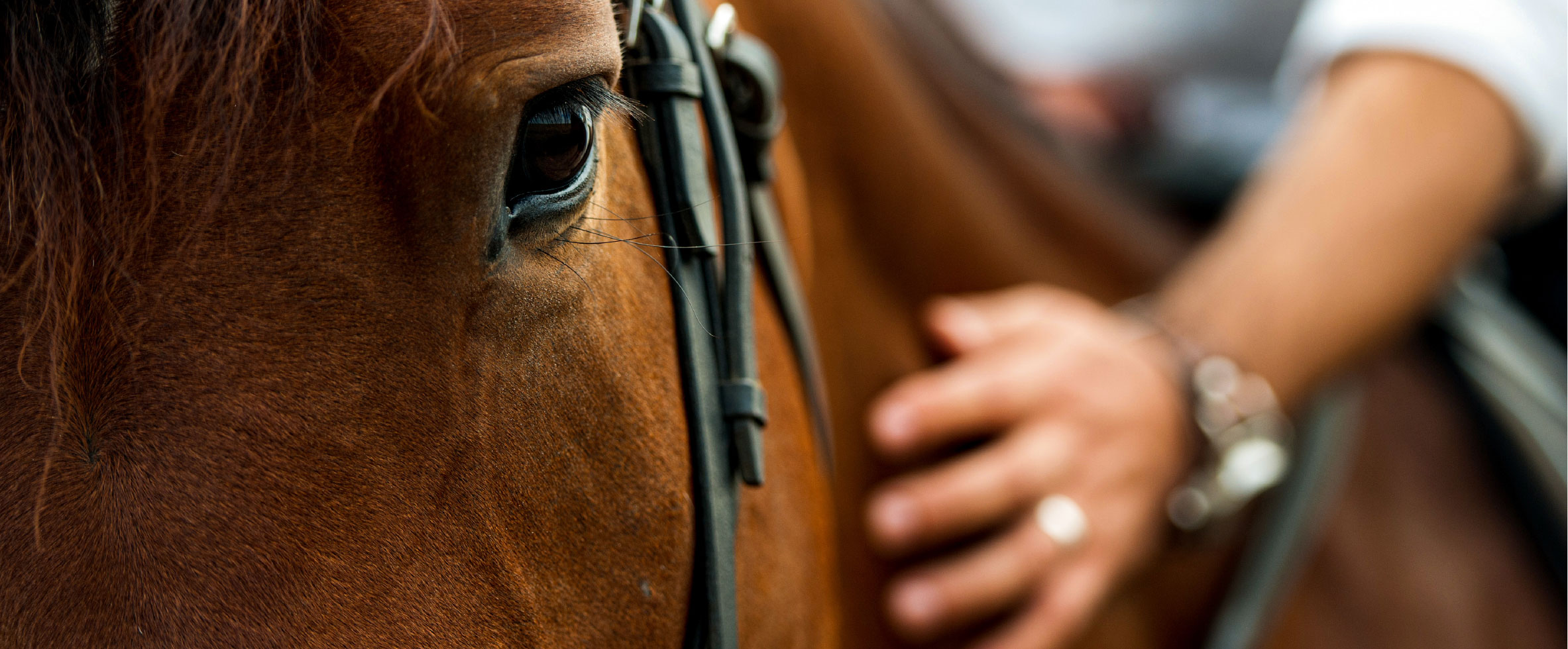Enrol Now
This pathway is designed to improve your understanding of the way horses behave, whether you’re a horse owner, or you work with horses in a yard or stables.
We have designed this career pathway to include courses that will help prepare you for working in this sector of the animal care industry. This pathway is made up of the following areas of study:
- Introduction to Equine Psychology
- Intermediate Equine Psychology
- Advanced Equine Psychology
This career pathway combines 3 of our individual courses, providing students with a clear and comprehensive path towards a career in animal care. What’s more, when you take this pathway, you’ll save £120*, compared to taking each course on its own.

What You Will Learn
Introduction to Equine Psychology
Unit 1
- Introducing the horse: history, development of types and breeds, and the horse as product of evolution
Unit 2
- The horse in the wild: social environment of the herd
- Environment and social structure, who is the boss?
- Exploring issue of dominance and hierarchy, foal development, the function of play
Unit 3
- Horses in the human environment: the fall and rise of the horse
- Changing attitudes – the role of the horse from industrial machine to leisure and sport, an artificial environment
Unit 4
- Getting in tune with our horse: being with horses
- Reading horse language
- Effects of human stress on horses
- Concepts of reductionistic vs holistic approaches
You will also complete a Special Study on a topic of your choice, relevant to the course.
Intermediate Equine Psychology
Unit 1
The horse sense:
- Sight
- Hearing
- Smell
- Touch
- Taste
Unit 2
How intelligent are horses?:
- What is intelligence
- The horse’s brain
- Old and new ideas
- Intelligence testing
- Relativity of intelligence
- Looking at human attitudes
Unit 3
How horses learn:
- Classical vs operant conditioning
- Positive and negative reinforcement
- Negative reinforcement vs punishment
Unit 4
Common behavioural problems:
- Biting, bolting, bucking, raring, napping, spooking
- Difficulty catching
- Trailer problems
- Bad behaviour with vet, farrier or dentist
You will also complete a Special Study on a topic of your choice, relevant to the course.
Advanced Equine Psychology
Unit 1
Horse/human relations and communication:
- Bonding and friendship
- Reading the signs, ‘speak’ horse, subtle communication, horse whisperers and animal communicators
- How human problems affect horses
Unit 2
Abnormal behaviour problems:
- Dealing with depression
- Stereotypes
- Stable vices
- Foal rejection
- Chronic stress
Unit 3
Case taking and procedure:
- Taking the case
- Dealing with owners
- Owner counselling
- Veterinary involvement
Unit 4
The importance of our part in the alliance with the horse
- Trust, choice, concentration, self- control, responsibility and reliability
- The listening ear and seeing eye
- The importance of low pulse rate and consistent body language
- Taking responsibility for our actions
- Positive and negative reinforcement
Level and Certification
There are no exams. On successful completion of this pathway you will receive the Animal Care College Certificate* in our ‘Work with Equine Psychology’ programme, graded to show the standard you have reached.
You will also receive the Certificate of Achievement at QLS Level 3 when you complete this course**.
Quality Licence Scheme endorsement involves robust and rigorous quality audits by external auditors to ensure quality is continually met. A review of courses is carried out as part of the endorsement process.
* The Animal Care College Certificate will be issued once you have successfully completed your course and finished your course payments.
**QLS registration fees included.
Entry Requirements
There are no prerequisites for this course. As a general guide, we recommend students looking to take one of our pathways should have some experience in their chosen field. However, we strongly believe open study should be just that. If you want to challenge yourself, our tutors will be on hand to help.
What's Next
This pathway can help you progress in your career in the animal care sector.
Once it’s completed, you may wish to further your study. If that’s the case, we’d suggest:
If you’d like to turn what you’ve learned into a career, or you’re wondering how best to apply it to your existing role, get in touch with one of our tutors, or contact our support team from 9am – 5pm.
How the Course Works
Your first unit will be sent to you when you enrol, you can start as soon as you want and progress through the course at your own pace, studying when and where you choose.
Your course materials are broken down into manageable units and will include helpful guidance and advice as well as additional reading lists and tools to signpost where you can source further information. We would encourage you to carry out wider reading and research on topics covered in the course materials.
Your learning materials have been developed by experts so studying is easy and enjoyable. At the end of each unit, there will be an assessment to complete and submit to your tutor.
Studying with the Animal Care College is a great place to start your learning journey and will give you a solid grounding in animal care subjects.
The Animal Care College’s courses promote the best care of pets at all stages of their development. We believe working and engaging with animals is a deeply rich and rewarding experience. Although the theory learning is important, being able to put your skills into practice beyond the theory is even more so. We are here to help you every step of the way as you build meaningful bonds with animals and gain in-depth knowledge that can only be obtained by working directly with animals. We can help advise on potential placements and work experience where necessary.
Study Length
There are no deadlines for this pathway. Simply study in the comfort of your own home, and in your own time.
Distance learning is designed to be flexible, but as a guide, students who can spend 4-6 hours a week studying tend to complete a single unit within a month.
Our Support Promise
You can contact our support team who are here to help you Monday to Friday, 9am to 5pm, at any point during your studies – to ask questions or for advice. Your tutor will mark your lessons, giving valuable, constructive feedback – helping you to master each step before moving on to the next. You can contact them for support or advice throughout your studies.
Course Fees & How to Enrol
When you take this pathway, you’ll save*, compared to taking each course on its own.
You can:
- Pay the total course fee of £195 in one sum and receive a £50 voucher towards the cost of your next course
- or
- Pay 3 monthly payments of £65 interest free
You can:
- Pay the total course fee of £245 in one sum and receive a £50 voucher towards the cost of your next course
- or
- Pay 3 monthly payments of £81.66 interest free
You can:
- Pay the total course fee of £295 in one sum and receive a £50 voucher towards the cost of your next course
- or
- Pay 3 monthly payments of £98.33 interest free
You can:
- Pay the total course fee of £325 in one sum and receive a £50 voucher towards the cost of your next course
- or
- Pay 3 monthly payments of £108.33 interest free
You can:
- Pay the total course fee of £345 in one sum and receive a £50 voucher towards the cost of your next course
- or
- Pay 3 monthly payments of £115 interest free
You can:
- Pay the total course fee of £395 in one sum and receive a £50 voucher towards the cost of your next course
- or
- Pay 3 monthly payments of £131.66 interest free
You can:
- Pay the total course fee of £445 in one sum and receive a £50 voucher towards the cost of your next course
- or
- Pay 3 monthly payments of £148.33 interest free
You can:
- Pay the total course fee of £595 in one sum and receive a £50 voucher towards the cost of your next course
- or
- Pay 3 monthly payments of £198.33 interest free
You can:
- Pay the total course fee of £645 in one sum and receive a £50 voucher towards the cost of your next course
- or
- Pay 3 monthly payments of £215 interest free
You can:
- Pay the total course fee of £745 in one sum and receive a £50 voucher towards the cost of your next course
- or
- Pay 3 monthly payments of £248.33 interest free
You can:
- Pay the total course fee of £795 in one sum and receive a £50 voucher towards the cost of your next course
- or
- Pay 3 monthly payments of £265 interest free
You can:
- Pay the total course fee of £895 in one sum and receive a £50 voucher towards the cost of your next course
- or
- Pay 3 monthly payments of £298.33 interest free
You can:
- Pay the total course fee of £995 in one sum and receive a £50 voucher towards the cost of your next course
- or
- Pay 3 monthly payments of £331.66 interest free
You can:
- Pay the total course fee of £225 in one sum and receive a £50 voucher towards the cost of your next course
- or
- Pay 3 monthly payments of £75 interest free
You can:
- Pay the total course fee of £147 in one sum and receive a £50 voucher towards the cost of your next course
- or
- Pay 3 monthly payments of £49 interest free
Enrol NowEnrol by phone, please call 01409 220 775
Monday to Friday, 9am-5pm
* compared to taking each course on its own






